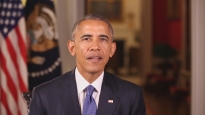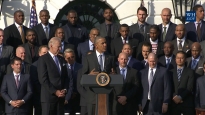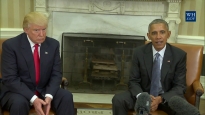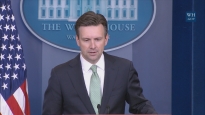Vice President Biden Delivers Remarks to The London Conference on Cyberspace
November 01, 2011 | 15:47 | Public Domain
The Vice President participates via video in a conference on the Internet and the networked world.
VP's Remarks to London Cyberspace Conference
Via Video Teleconference
10:42 A.M. EDT
THE VICE PRESIDENT: Well, thank you very much, Foreign Secretary Hague, and my best to Prime Minister Cameron. I agree with everything that he said today.
But I’m very glad to be able to join you all on behalf of our administration to talk about the issue that will have enormous, enormous consequences for each of our countries and, quite frankly, consequences for the whole world: the future of cyberspace.
And I do bring greetings from Secretary Clinton who does send her regrets that she’s not able to be with you in person today.
As you all know, nearly one-third of humankind is online today, something we would have never thought possible 20 years ago, more than 2 billion people and counting. The Internet has become the public space of the 21st century, a sphere of activity for all kinds of activities, open to all people of all backgrounds and all beliefs.
And as vibrant, as dynamic as the Internet already is what we’ve seen so far, I believe and we believe, is just an opening act. More than 5 billion people will connect to the Internet in the next 20 years -- 5 billion. And most of them will live in countries and regions that are now under-represented online. And the next generation of Internet users has the potential to transform cyberspace in ways we can only imagine. And cyberspace, in turn, has the potential to transform their lives, as well.
But the extent of both the contributions they will make to the Internet and the benefits they’ll derive from it are going to depend in large degree on the choices all of us in the room today make. The Internet itself is not inherently -- to state the obvious -- is not inherently a force for democracy or oppression, for war or for peace. Like any public square or any platform for commerce, the Internet is neutral. But what we do there isn’t neutral. It’s up to us to decide whether and how we will protect it against the dangers that can occur in cyberspace while maintaining the conditions that give rise to its many benefits. That's what Prime Minister Cameron just spoke about.
And today I’d like to explain briefly where the United States stands on key issues regarding the future of cyberspace. First, which approach should we take for ensuring that Internet -- that the Internet itself continues to be secure, open to innovation and interoperable the world over; secure enough to earn the trust of our people, and reliable enough to support their work?
And secondly, how do we achieve security for nations, businesses and people online without compromising the openness that is the Internet’s greatest attribute?
It seems to us that answering these questions is a key priority for not only our administration, but for all of you assembled in the room; and to articulate our position, we laid out the International Strategy for Cyberspace.
We know that it will take many years and patient and persistent engagement with people around the world to build a consensus around cyberspace, but there are no shortcuts because what citizens do online should not, as some have suggested, be decreed solely by groups of governments making decisions for them somewhere on high. No citizen of any country should be subject to a repressive global code when they send an email or post a comment to a news article. They should not be prevented from sharing their innovations with global consumers simply because they live across a national frontier. That's not how the Internet should ever work in our view -- not if we want it to remain the space where economic, political and social exchanges can flourish.
Now, there are some who have a different view, as you all know. They seek an international legal instrument that would lead to exclusive government control over Internet resources, institutions and content and national barriers on the free flow of information online. But this, in our view, would lead to a fragmented Internet, one that does not connect people but divides them; a stagnant cyberspace, not an innovative one, and ultimately a less secure cyberspace with less trust among nations.
So the United States stands behind the current approach which harnesses the best of governments and private sector and civil society to manage the technical evolution of the Internet in real time. This public-private collaboration has kept the Internet up and running all over the world.
We have an expression in our country: If it ain’t broke, don't fix it. It would be misguided, in our view, to break with the system that has worked so well for so long. However, as the Prime Minister pointed out, there are ways we can improve on what we’re doing; for example, by bringing greater transparency and accountability to Internet governance and institutions, by including more voices from developing countries and by supporting successful initiatives like the Internet Governance Forum.
Just as important in our view, as to whether the Internet functions effectively, is what people are free to do there in that space without fear of being targeted by criminals or having their private information exposed or being punished by their governments for expressing their views online.
And this brings me to the second question that I’d like to address today, how to achieve both security and openness in cyberspace. As we all know, the openness that makes the Internet a force for unprecedented progress can also enable wrongdoing on a vast scale. Terrorists use the Internet to recruit operatives and plot attacks. Human traffickers and child pornographers use the Internet to find and exploit victims. And sensitive information is stolen every day from both governments and businesses by criminal networks, as well as individuals, and even by other nation states. And we all face the threat that our critical infrastructure will be compromised by a cyberattack. It’s a real threat.
And to address these challenges, the United States is investing in our cybersecurity, including the appointment here at the White House of a national cyberspace [sic] coordinator. He’s with you now -- Howard Schmidt, who is in the audience with you and will speak on international security later today.
We’re working with other nations to fight transnational crime, including by helping other nations build their law enforcement capacities. We’ve ratified and we strongly promote the Budapest Cybercrime Convention, which sets out the steps countries must take to reduce cybercrime while still protecting human rights. And as you might expect, we remain committed to fighting international terrorism and thwarting terrorist attacks that are planned and launched on the Internet.
We can and we must do all of this without resorting to a false solution that rationalizes government takeover of the Internet. There’s no question in our view that every nation must protect its citizens against crime and attacks online, as well as off. But we must do it in a manner that's consistent with our shared values.
And this brings me to the concept that is absolutely fundamental in our view to any conversation about the future of cyberspace: Existing principles of international law apply online, just as they do offline, in our view.
Yes, the Internet represents and presents new challenges, but to resolve them we don't need to start from scratch. International law principles are not suspended in cyberspace. They apply there with equal force and equal urgency.
Take, for example, the threat of cyberspace conflict between states. For more than a century, the global communities worked to develop rules that govern conflicts among nations, including concepts of proportionality, and distinction between combatants and civilians. And we’ve developed diplomatic methods that countries can take together to prevent war, respond to attack and build trust with one another. So while cyberspace is a new realm, we have many, many years of hard-won understandings to guide us in this new space.
Of course, cyberspace presents challenges that are different from any we’ve faced before, and it raises new questions. It forces us to come up with new approaches where old ones no longer suffice. Consider confidence-building measures. It’s a great deal harder to assess another nation’s cyber-capabilities than to count their tanks, for example. The technology is dual-use. Governments don't have a monopoly on it, and we can't -- you can't judge the intentions of another country by looking at its force -- like by looking at its force posture. So it’s a challenge to identify effective, confidence-building measures in cyberspace. We’ve got to find a way.
For example, the United States is working closely with Russia to reach an agreement that would establish links between our computer emergency response teams and our nuclear risk reduction centers to build cooperation and to set up lines of communication in the event of an alarming incident.
We’re also looking to multilateral institutions such as the OSCE, which has a history of developing confidence-building measures in the context of conventional warfare to contribute their expertise to this quest. But in our quest for security, we cannot sacrifice -- I want to emphasize we believe we cannot sacrifice the openness that makes possible all the benefits and opportunities that the Internet brings.
The tactic of evoking security as a justification for harsh crackdowns on freedom is not new in the digital age. But it has new resonance as the Internet has given governments new capacities for tracking and punishing human rights advocates and political dissidents. In some places, as you all know, bloggers are imprisoned and abused for criticizing the government. In others, there is widespread censorship of content that government deems politically unacceptable.
Look, folks, again, no surprise, the United States -- and I suspect most of you, I hope -- stand against these acts and for Internet freedom. The rights of individuals to express their views and petition their leaders, practice their religion, assemble with their fellow citizens online we believe must be protected. These rights are universal whether they're exercised in the town square or on a Twitter stream. They're enshrined in the Universal Declaration of Human Rights, which applies to cyberspace just as surely as it does to every corner of every country on Earth.
Those countries that try to have it both ways by making the Internet closed to free expression but open for business will find that this is no easy task. They may try to build walls between these different activities, but there isn’t a separate economic Internet, political Internet and social Internet. They are all one. It’s simply the Internet.
The same search engines that help customers find local businesses also point them to websites of bloggers and civil society groups. Social networking sites allow friends to share not only home videos, but also views about the political and social issues within their country.
Trying to build and maintain barriers in cyberspace entails a variety of cost, not just the cost of paying thousands of censors and Internet police to work around the clock, but also the opportunity costs to a nation’s future. And I believe all nations will ultimately determine this. The digital marketplace of ideas that welcomes every blog and tweet is the same one that inspires the next generation of innovators to fuel our economies. And when businesses consider investing in a country with a poor record on Internet freedom, and they know that their website could be shut down suddenly, their transactions monitored, their staffs harassed, they’ll look for opportunities elsewhere.
Look, we are meeting at a pivotal moment, an inflection point in the history of cyberspace. The number of people online is about to make a huge jump, and countries will now have to make some important choices about which principles and policies they will embrace, so I urge -- I urge countries everywhere to join us in the bet we’ve made, a bet that an open Internet will lead to a stronger more prosperous life for people in all of our countries, and a bet that by building a global consensus around universal values and shared norms, we can together preserve the Internet as an open space for all, which will pay long-term gains for all of us in shared prosperity as well as security, and in the process increased friendship.
As President Obama said in our international strategy, what the United States offers today is an invitation for partnership. We’re reaching out to countries around the world, as well as the private sector and civil society to build a consensus around the ideals that I’ve mentioned today: security and openness; transparency and accountability; innovation, freedom and above all, a commitment to working cooperatively to govern cyberspace in a manner that's consistent with longstanding international principles.
Folks, as we look ahead, let’s remember what in the end we’re working to achieve. We’re here so that tomorrow when a village in India opens the doors of its first Internet café, a school in Kenya cuts a ribbon on its new computer lab, a teenager in Guatemala writes his first blog post, and a grandfather there in London writes his first email, they will be free to explore all the benefits of the Internet, and all the benefits it can bring, have their lives enriched and be part of enriching the lives of others. We’re working for 5 billion people who will join cyberspace in the years ahead so that they’ll be able to experience the open, free and secure Internet. For their sake and for ours, we’ve got to get this done.
I thank you all for listening, particularly via this remote mechanism. I again, Mr. Secretary, thank you very much for your hospitality. Good luck to us all.
END
10:58 A.M. EDT
|
November 14, 2016
|
November 12, 2016
|
November 11, 2016
|
November 11, 2016
|
|
November 10, 2016
|
November 10, 2016
|
November 10, 2016
|
November 9, 2016
|
- &lsaquo previous
- …
- 9
- 10
- 11
- 12
- 13
- 14
- 15
- 16
- 17
- …
- next &rsaquo







